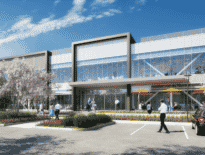Replacement of the Allston viaduct and realignment of the Massachusetts Turnpike would open up 85 acres of land for development and add a brand-new commuter rail station. Courtesy photo
A Harvard University official confirmed talks with the Massachusetts Department of Transportation on construction of an elevated deck at the planned MBTA West Station, which would open up development opportunities over the Massachusetts Turnpike in Allston.
Expanding the platforms over and around the planned multimodal station would bridge the rail lines and turnpike, reconnect the northern and southern sides of Allston and create new connections to the Charles River, Executive Vice President Katite Lapp wrote.
Echoing a statement issued this week by Mayor Michelle Wu, Harvard said any development in the area would be subject to review and approval by Boston planning and zoning regulations.
Issued Wednesday, Lapp’s letter responds to an inquiry from state Rep. Michael Moran, whose district includes Allston, about Harvard’s latest intentions for development in the neighborhood following completion of the Interstate 90 multimodal project. The estimated $1.7 billion project will relocate the Massachusetts Turnpike south in the area of the former Allston-Brighton tolls and allow Harvard to build a large mixed-use development on land that it owns to the north.
“West Station needs to be woven into the transportation system and urban fabric, which is why Harvard has been focused on decking above and around the station since as far back as 2014,” Lapp wrote.
Discussions with Boston and state officials have focused on “preserving the technical viability” of decking, but Harvard has not determined any specific plans for development, Lapp wrote. The scope of development is tied to the cost of the deck project.
State transportation officials last year chose an at-grade option for the section of Turnpike that will be rebuilt as replacement of the aging Allston viaduct, located between Boston University and the Charles River. The project includes the new multimodal station with a stop on the Framingham-Worcester commuter rail line and a pedestrian-bike path.
The increased clarity over MassDOT’s direction since last fall’s announcement allows more detailed planning for future development in the area. MassDOT officials have said they expect the city of Boston and Harvard to contribute to the project, which could take up to 10 years.








